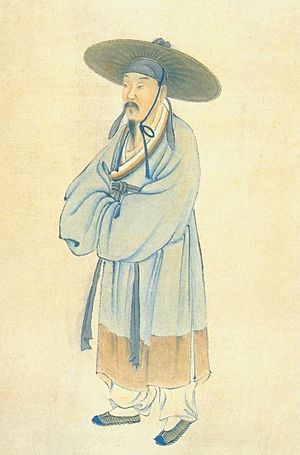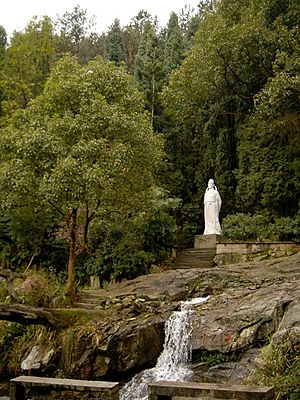Lu You facts for kids
Quick facts for kids Lu You |
|||||||||||||||||||||||||
|---|---|---|---|---|---|---|---|---|---|---|---|---|---|---|---|---|---|---|---|---|---|---|---|---|---|

Portrait of Lu You
|
|||||||||||||||||||||||||
| Traditional Chinese | 陸游 | ||||||||||||||||||||||||
| Simplified Chinese | 陆游 | ||||||||||||||||||||||||
|
|||||||||||||||||||||||||
| Wuguan (courtesy name) |
|||||||||||||||||||||||||
| Traditional Chinese | 務觀 | ||||||||||||||||||||||||
| Simplified Chinese | 务观 | ||||||||||||||||||||||||
|
|||||||||||||||||||||||||
| Fangweng (art name) |
|||||||||||||||||||||||||
| Chinese | 放翁 | ||||||||||||||||||||||||
|
|||||||||||||||||||||||||
Lu You (traditional Chinese: 陸游; simplified Chinese: 陆游; 1125–1210) was a famous Chinese historian and poet. He lived during the Southern Song Dynasty (南宋) and is well-known for his many poems about loving his country.
Contents
Lu You's Life Story
Growing Up in a Divided China
Lu You was born on November 13, 1125, on a boat on the Wei River. At that time, China was split into two parts. The northern part, ruled by the Song dynasty, was being attacked by the Jurchens from the Jin dynasty. These attacks were part of the Jin–Song wars.
Lu You's family had to flee south when he was just one year old because the Jin dynasty captured the northern capital. His family included government officials, so he received a very good education. He was taught to be very patriotic. From a young age, Lu You wanted to help China get rid of the Jurchen invaders and reunite the country.
A Sad Love Story
Lu You grew up with his cousin, Tang Wan (唐琬). She was a quiet person who loved reading and writing. They fell deeply in love and got married when Lu You was 20.
However, they did not have children, and Lu You's mother did not like Tang Wan. In traditional Chinese culture, children had to obey their parents. Even though Lu You and Tang Wan were happy together, his mother made them divorce. She wanted Lu You to focus only on his studies and his dream of saving China. Lu You loved his mother and sadly divorced Tang Wan.
Later, Tang Wan married a nobleman, and Lu You married another woman. Eight years after their divorce, when Lu You was 31, he saw Tang Wan and her new husband by chance in Shen's Garden (沈園). Tang Wan offered him a cup of wine, and Lu You saw tears in her eyes. His heart was broken. He drank the wine and then wrote a famous poem called "Phoenix Hairpin" (Chai Tou Feng) on the garden wall.
Tang Wan read his poem and wrote her own poem in response. She died less than a year later. Lu You never forgot her. The year before he died, at age 85, he wrote another poem about Shen's Garden to remember his first love. Their love story is very famous in China and has even been made into a traditional Chinese opera.
Lu You's Work and Career

When Lu You was 12, he was already an excellent writer. He was also skilled in sword fighting and knew a lot about war strategies. He took the civil service examination at age 19 but did not pass. Ten years later, he tried again and passed, even coming in first in his region!
However, this success caused problems. The grandson of a powerful official named Qin Hui also took the exam. Lu You's high score meant he might take first place in the next national exam. Because of this, Lu You and other top students were prevented from taking the national exam.
Starting His Government Job
After Qin Hui died, Lu You finally started working in the government. He strongly believed that China should fight against the Jin dynasty. But many other officials were not interested in fighting. Because Lu You kept pushing for war, he lost his job.
In 1172, he got a job helping with military plans. This experience made him even more determined to reunite China. He wrote many powerful poems showing his strong love for his country. But the Song Dynasty government was not very active, and many officials just wanted an easy life. Lu You felt he couldn't use his talents.
Later Life and Retirement
Lu You's ideas about fighting the Jurchens were not popular at the time. He felt there was no place for him in official life. He started to call himself "Fangweng" (放翁), which means "Liberated Old Man," and sometimes made fun of himself in his poems.
After several ups and downs in his career, Lu You retired in 1190. He moved back to his hometown, Shaoxing, which was a quiet countryside area. He spent the last 20 years of his life there. Lu You stayed healthy and enjoyed eating pearl barley and tree-ear mushrooms. This helped him keep his eyesight and hearing good until he died.
Even in retirement, he still hoped China would fight the Jin dynasty, but it never happened. His wife died in 1197. Lu You died on January 26, 1210, at age 86. His biggest regret was that northern China was still controlled by foreigners.
Lu You's Poetic Style
Lu You wrote about 11,000 poems, which is a huge number! He wrote in both the shi and ci styles. He also wrote many prose works. He is known as one of the most productive poets before the 15th century. In his poems, he often wrote about his strong belief that China should take back the north.
His poems can be grouped into three main periods:
- First Period: From his teenage years to age 46. He wrote fewer poems during this time because he later destroyed many of his early works.
- Second Period: From age 46 to 54. During this time, he joined the military, and this experience greatly influenced his writing. He wrote over 2,400 poems in this period.
- Third Period: From his retirement until his death. He wrote about 6,500 poems during this period. These poems include peaceful scenes of country life, but also feelings of sadness and emptiness.
No matter how his style changed, Lu You's poems always showed his deep love for his country. This patriotism is the most important part of his poetry and why his works are still valued almost a thousand years later.
Famous Poems by Lu You
Lu You wrote many poems. Here are some of his most famous ones:
- To My Son (示兒, Shi Er)
He wrote this poem when he was close to dying.
死去元知萬事空,
但悲不見九州同。
王師北定中原日,
家祭無忘告乃翁。
All turns to dust in my dying eyes,
My only sadness is not seeing China united.
When the emperor's troops take back the North,
You must not forget to tell me at my tomb.
This poem means that Lu You didn't care about leaving anything behind when he died. But he was very sad that China was still divided. He told his son that if China ever became united again, his family must visit his grave and tell him the good news.
- Rainstorm on the Eleventh Month 4th (十一月四日風雨大作)
This poem was written when Lu You was old and retired. It shows his strong patriotism and his vivid memories of fighting in the North.
僵臥孤邨不自哀,
尚思爲國戍輪台。
夜闌臥聽風吹雨,
鐵馬冰河入夢來。
I lay stiff and alone in a lonely village, without feeling sorry for myself.
I still think of fighting for my country.
Deep into the night, I lie and hear the wind blowing the rain.
Armored horses and the icy river came into my dream.
- Phoenix Hairpin (釵頭鳳)
This poem is about his sad love story with Tang Wan.
紅酥手,黃藤酒,
滿城春色宮墻柳。
東風惡,歡情薄,
一杯愁緒,幾年離索,錯,錯,錯。
萅如舊,人空瘦,
淚痕紅浥鮫綃透。
桃花落,閒池閣,
山盟雖在,錦書難托,莫,莫,莫。
Pink soft hands, yellow rippling wine,
The town is filled with Spring, willows by palace walls.
The east wind is biting, happiness is thin,
Heart full of sorrow, so many years apart.
Wrong, Wrong, Wrong!
Spring is as of old; the person is empty and thin.
Traces of tears show through the sheer silk.
Peach blossoms falling, quiet pond freezing,
The huge oath remains, the brocade book is hard to hold.
Don't, Don't, Don't!
In this poem, "biting east wind" is a way of talking about the traditional Chinese views that broke up his first marriage. "Brocade book" is a metaphor for his dream of uniting China. He felt he was not successful in either his marriage or his career.
- Plum Blossom (卜算子-咏楳)
驛外斷橋邊
寂寞開無主
已是黃昏獨自愁
更著風和雨
無意苦爭春
一任群芳妒
零落成泥碾作塵
只有香如故
Near the broken bridge outside the fortress,
I bloom lonely and without an owner.
It is dusk and I am alone and worried,
Especially when the wind and rain start to blow.
I do not mean to fight for Springtime,
I would rather be alone and envied by the crowd.
I will fall down, become earth, be crushed to dust.
My glory will be the same as before.
Images for kids
See also
 In Spanish: Lu You para niños
In Spanish: Lu You para niños



